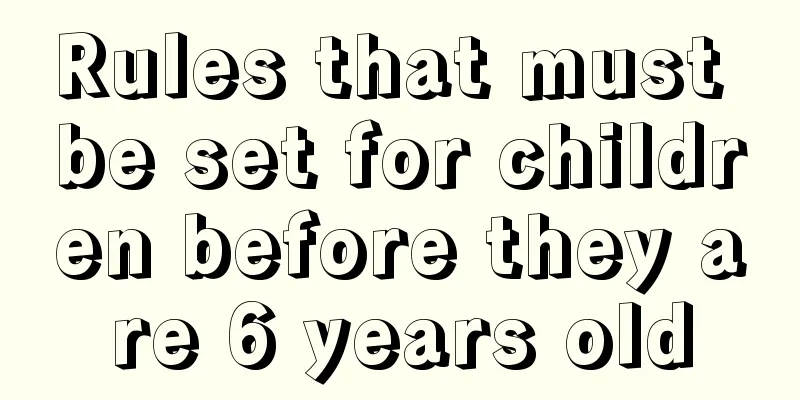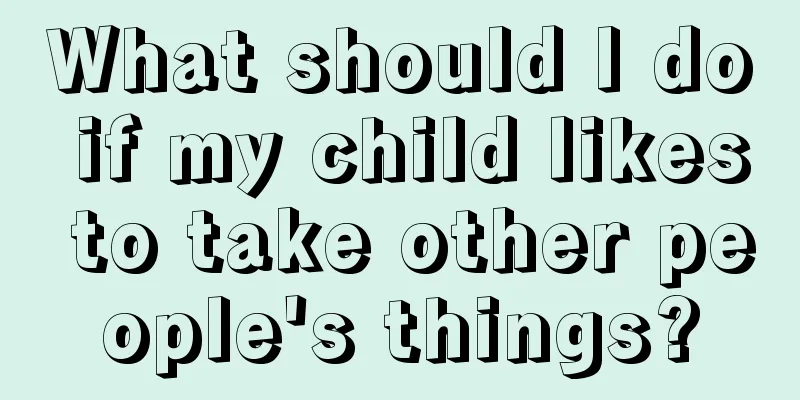Rules that must be set for children before they are 6 years old

|
There is no order without rules. Children under the age of 6 are in the stage of developing various consciousness. If there are no rules set by their parents to restrain them, children are likely to do whatever they want and do not know how to judge whether their words and deeds are good or bad. Such children will become people who do not abide by the rules when they grow up, which will have a great impact on their interpersonal relationships. So, what rules should parents set for their children? How should they enforce the rules on their children after setting them? Let's take a look at how to set rules for children before the age of 6: Rule 1: Rude and vulgar behavior is not allowed. What kind of behavior is considered rude and vulgar for children? For example, when Lele was trying to snatch something from other children in kindergarten and the children refused to give it to him, he started beating them and said, “If you don’t give it to me, I will let my brother make you disabled!”... Lele’s behavior was rude and vulgar. This type of children like to use violence to force others to obey their will, and use words to attack and coerce others in order to achieve their own wishes. However, this approach is absolutely not advisable! If a child behaves in a vulgar manner, what should parents do? First of all, we need to help the child distinguish right from wrong, and tell him clearly: "Le Le can't do this again in the future. This is rude behavior and he will be criticized!" Then let the child reflect on himself and come up with a better way to deal with such things. For example, the mother can ask: "Le Le knows he is wrong now, so what should he do when he wants to play with other children's toys in the future?" Mom and dad guide him calmly. In such an environment, smart children can quickly find other solutions. At this time, you should also give him appropriate encouragement and set this rule for him. Such rules can help children adjust their emotions, learn how to treat what they want, how to deal with their own emotions, how to deal with emotions that have already occurred, and so on. In this process, children will constantly adjust their views on things and their own mentality. When he grows up, he will also use this model to treat people around him, becoming more rational and considerate of others. Rule 2: Don’t take other people’s things Children under the age of 6 have just begun to develop a sense of self-awareness, and often find it difficult to distinguish between themselves and others, let alone know how to tell what belongs to them and what belongs to others. So as long as the child likes something, he will reach out and take it without hesitation, thinking "Once it's in my hand, it's mine!" Just like Lele, he always says, "Mom is mine, Dad is mine too, and all the toys are mine!" As long as he sees his parents holding other children's hands or his toys are taken away by others, Lele will burst into tears... At this time, parents should consciously help their children establish self-awareness. They can hold adult clothes and children's clothes and tell them: "This one is yours, this one is dad's, and this one is mom's." Help him establish boundaries between himself and others. When the child can clearly distinguish between himself and others, parents should also deliberately ask the child more questions: "Is this yours?" Let him make independent judgments and set rules for him. Such rules can help children better distinguish between "yours" and "mine", and know that things that are not theirs belong to others, and they cannot take other people's things, while "mine" things must be under my control. This distinction in the concept of property rights is the foundation of the most basic morality and mentality. Only when he grows up will he understand how to respect others better.
The child’s ability to take care of himself is not very good. When he plays by himself, he always likes to throw his toys around. When he gets tired of playing, he throws them away and waits for his mother to help him clean up the mess. Many mothers would not say anything, thinking that "the child is still young and doesn't know how to clean up, so it would be easier to help him do it." In fact, children under the age of 6 are fully capable of packing up their own things, but their parents’ pampering and indulgence make them lose the opportunity to exercise themselves. You might as well set rules for him, such as putting away his toys after playing, tidying up his desk after finishing his homework, etc., so that he learns to put things back where he took them from. Such rules can help children learn to take care of the environment, and ultimately develop respect for the environment and self-cultivation. Moreover, while putting things back in place, the child also improves his ability to take care of himself. Moreover, when tidying up his desk, he can decide by himself where to put things, which also helps his creativity. When he grows up, no matter what environment the child is in, he will be able to develop the good habit of "returning to his place", and his life will be tidier. Rule 4: Whoever gets it first gets it first, and the latecomers have to wait. At home, parents always put their children first. They give in to their children in everything, give them food first, let them choose fruits first, etc. However, such blind concessions from parents will only make their children more and more self-centered, thinking "Mom and Dad have to give in to me, I am the biggest!" Children who grow up in such an environment are likely to feel that they are superior to others, and it will be difficult for them to make friends when they grow up! To overcome the bad habits of "little emperors" and "little princesses", we must start with the parents. Mom and Dad can set rules for their children and always abide by the "first come, first served" rule. For example, when eating, whoever the mother arrives at the table first will eat first. If the child never comes, he will experience the consequences of not having any food to eat. When brushing teeth, whoever gets to the bathroom first will brush teeth first... In this way, they can slowly help children form the habit of "first come, first served". Such rules can prevent him from developing selfish habits, make him understand that when others get something first, he must learn to wait and form an equal communication model. Rule 5: Don’t interrupt others when they are speaking When children encounter good things, such as being praised by the teacher, making a new friend, etc., they are always excited to tell their parents about it, and they will interrupt their parents without hesitation no matter what they are doing. Moreover, many parents nowadays put “children first”, so they often allow their children to interrupt them at any time and will happily respond to their children. Such an attitude can easily make children develop the habit of disturbing others at all costs. When they grow up, they may be self-centered and find it difficult to live in a group. If you find your child has such a bad habit, parents should consciously help him correct it in daily life and tell him: "It is very impolite to disturb others casually. Think about it, if the baby is sleeping and other children always come over to talk to you, will the baby be happy?" Use calm guidance to let the child learn to think from the other person's perspective, let him know that being disturbed by others is a very unhappy thing, and then set rules for him. Such rules can help children learn to respect others and let them know that they should not disturb others when they are busy. In addition, children learn to think from others' perspectives in the process and become more considerate, which makes it easier for them to make many good friends! Rule 6: Apologize when you do something wrong Parents love their children and always think that "the child is still young" and give in to them in everything. Even if the child makes a mistake and does not apologize, parents will forgive him out of tenderness. This kind of handling method will make children feel that "it's no big deal to make mistakes, my parents will forgive me anyway". Without restraint, children will inevitably do whatever they want and make more serious mistakes. In fact, although children under the age of 6 are young, they have begun to understand things. At this time, parents should seize the opportunity to teach them from an early age that "you must apologize when you do something wrong, so that you can be a good and polite child!" When a child makes a mistake, in addition to educating him, you can order the child to say sorry to him. If the parents have wronged the child, they should also apologize to the child, set a good example for the child, and abide by the rules with the child. Such rules can help children learn to be polite to others, be honest, and have the courage to admit their mistakes. In this process, children also learn to reflect on themselves and begin to understand how to protect their rights. Before the age of 6, children's various consciousness are still in the budding and development strategy stage, which is the best time to educate children to abide by the rules. During this period, parents can reduce their indulgence in their children, set stricter rules for them, and follow them seriously with their children, so as to cultivate good habits of abiding by rules and being civilized and polite in their children from an early age. And with the company of their parents, children will also like the "game" that requires following the rules and grow up healthily through the "game". |
<<: Causes and dangers of childhood obesity
>>: 6 golden personalities that children must have
Recommend
Can a baby's head tilt heal on its own?
The head of a newborn baby is actually very soft....
What should I do if I have congenital amblyopia or hyperopia?
Eyes are the windows to the soul. Through people&...
What are the symptoms of fever and cramps in babies?
We all know that cramps are very uncomfortable. T...
What is in the appetizer tea for toddlers?
Many babies grow up drinking milk powder or breas...
What should I do if my three-year-old baby is deficient in calcium and zinc?
Nowadays, more and more babies are suffering from...
What are the dangers of children's tooth fillings killing nerves?
Children always like to eat some sweets, which is...
What are the recipes for children with diarrhea?
Children may have diarrhea because they have eate...
How to treat toothache in children
Toothache in children is a relatively common dise...
What are the dangers of children's balance bikes?
In life, we often see children riding parallel bi...
What should I do if my baby has phlegm when sleeping at night?
Every baby has a different physique, so babies of...
What causes breast development in boys?
Do you know about the problem of male breast deve...
Child with blocked nose and difficulty breathing
Now is the season for viral colds. At this time, ...
Can a one-year-old baby use Fengyoujing?
Fengyoujing is a very common medicine, and in fac...
What to eat for children with precocious puberty
Today's parents pay more attention to their c...
What should I do if my child has phlegm in his mouth?
Having phlegm in the mouth is a very common pheno...









